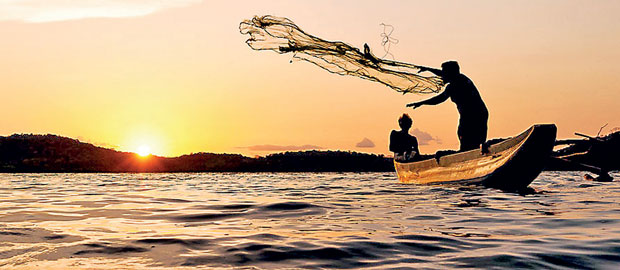18 Jul 2017 - {{hitsCtrl.values.hits}}
 BY Natalie Klein
BY Natalie Klein
This week, Sri Lanka adopted an amendment to its Fisheries and Aquatic Resources Act banning bottom trawling fishing in its waters. Those in violation of the new law will face a significant fine and the possibility of two years in prison. It is an important move for Sri Lanka in addressing Indian fishing in the Palk Strait.
The Palk Strait lies between the Indian state of Tamil Nadu and Northern Province of Sri Lanka. It was recently estimated that 1,000 Indian fishing trawlers are taking 200,000 kilogrammes of fish in a day from the Sri Lankan side of the boundary. Both the ongoing depletion of fish stocks as well as Indian fishers’ continued use of bottom trawler fishing vessels in Sri Lankan waters have been a source of high tension between India and Sri Lanka.
The adoption of this amendment is an important step forward for Sri Lanka, as it ensures that the island state has the proper legal framework in place to take action to protect its resources and its marine environment. It also sends a strong signal to its own fishers and to India that it wants this practice stopped now.
The critical questions that follow are whether the Indian fishers will heed the ban and how zealous Sri Lanka will be in the enforcement of its new law.
India has thus far urged restraint by Sri Lanka. Such a policy would make sense as the central Indian government seeks to ensure good relationships with state governments. This approach is critical in relation to Tamil Nadu, where many of the fishers are also involved in state politics.
But how restrained does Sri Lanka need to be? Acting sooner rather than later may be preferable to ensure the long-term sustainability of the fish stocks and the preservation of the marine environment. Continued progress on this issue is essential to respond to the needs of the impoverished Tamils living in northern Sri Lanka.

The critical questions that follow are whether the Indian fishers will heed the ban and how zealous Sri Lanka will be in the enforcement of its new law
Depending on how law enforcement efforts proceed, one further option for Sri Lanka to consider is litigation under the UN Convention on the Law of the Sea. Both India and Sri Lanka are parties to this treaty. As parties, each has consented to the possibility of disputes concerning the interpretation and application of the UN Convention being referred to international arbitration.
Sri Lanka could readily claim that India has failed to act with sufficient diligence in preventing illegal fishing in Sri Lanka’s waters. It will be a question of fact as to whether India can demonstrate that it has done enough. India’s response to Sri Lanka’s bottom trawling ban will become a vital part of this assessment.
Dispute settlement under the UN Convention has already addressed these sorts of questions. In an Advisory Opinion for the Sub-Regional Fisheries Commission, the International Tribunal for the Law of the Sea noted that states are to take all necessary measures to ensure compliance with fishing laws. States are also to take measures to prevent illegal fishing by those vessels flying its flag. In the South China Sea arbitration, a tribunal found that China was aware of, tolerated and failed to exercise due diligence over Chinese flagged vessels in violation of the Philippines’ fishing rights.
Sri Lanka could also argue that allowing the continued practice of bottom trawling is a violation of India’s obligations to protect and preserve the marine environment. It is well recognized under the UN Convention that the conservation of marine living resources is an element in the protection and preservation of the marine environment. In the South China Sea arbitration, China’s failure to prevent its fishers from engaging in harvesting in a manner that was severely destructive of the ecosystem, in this context the use of dynamite and propeller chopping, violated the UN Convention.
Political feasibility
In instituting proceedings, Sri Lanka would also have the possibility of seeking provisional measures pending the resolution of the dispute. Provisional measures might allow for an order that India take all steps immediately to prevent bottom trawling by its nationals in the Palk Strait so as to prevent on an urgent basis serious harm to the marine environment.
While this legal option is clearly open to Sri Lanka, is it politically feasible? One of the notable features about litigation under the UN Convention of late is that smaller states have been taking on larger states as a way of asserting their rights in a way that has not proven successful in other forums. Such was the situation for the Philippines against China, Mauritius against the United Kingdom and even the Netherlands against Russia. Sri Lanka can note that Bangladesh has previously pursued this option against India.
Sri Lanka would of course be sensitive to the political relationship between the central government in India and the state government in Tamil Nadu. Yet, one advantage of international litigation is that the judgment may provide a government with a new basis to act. The central government might find itself with more leverage over the state government if it has to take prompt action because it must show its commitment to the rule of international law in complying with a possible award against it.
Such a show of commitment for India would be appropriate following the recent election of Neeru Chadha to the International Tribunal for the Law of the Sea. Moreover, India has previously shown its support of the rules-based system established under the UN Convention in resolving other maritime disputes.
For example, India could have blocked Bangladesh in its efforts to resolve their maritime boundary dispute through litigation under the UN Convention. However, India was prepared to settle this long-standing dispute with its less-powerful neighbour through arbitration under the UN Convention. India also has experience as a respondent to a case under the UN Convention with Italy’s challenges to India’s exercise of jurisdiction over two of its marines on the MV Enrica Lexie.
In light of this experience, a Sri Lankan effort to utilize international litigation may not be an excessive diplomatic affront to India. As a smaller state forging a new foreign policy post-civil war, Sri Lanka can and should show its commitment to the rules-based international system.
While international litigation may be perceived as a hostile move between countries, it actually takes a major bilateral issue off the table and allows discussion on other important topics between the parties while the case runs its course. This was an important advantage for Australian diplomats in their dealings with Japan once litigation over Japan’s whaling activities began.
Taking on this fight against its neighbour may prove too daunting for Sri Lanka. For the moment, the enforcement of its new trawler ban will be a priority. However, going forward, its negotiating position with India should at least be strengthened in the knowledge that there is an international legal system at its disposal to support Sri Lanka in stopping damaging fishing practices in its part of the Palk Strait.
(Professor Natalie Klein is a widely-published expert in international law and maritime security at Macquarie Law School in Sydney, Australia. She recently made a presentation on ‘Law of the Sea and Dispute Resolution’ at a Seminar on Emerging Issues in the Indian Ocean, convened by the Lakshman Kadirgamar Institute (LKI) on June 28, 2017. The opinions expressed in this article are the author’s own. They are not the institutional views of the LKI and do not necessarily represent or reflect the position of any other institution or individual with which the author is affiliated)
09 Jan 2025 2 hours ago
09 Jan 2025 4 hours ago
09 Jan 2025 6 hours ago
09 Jan 2025 6 hours ago
09 Jan 2025 7 hours ago